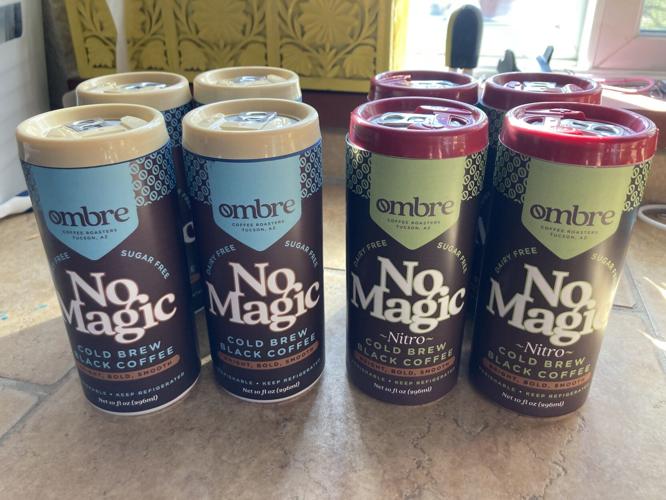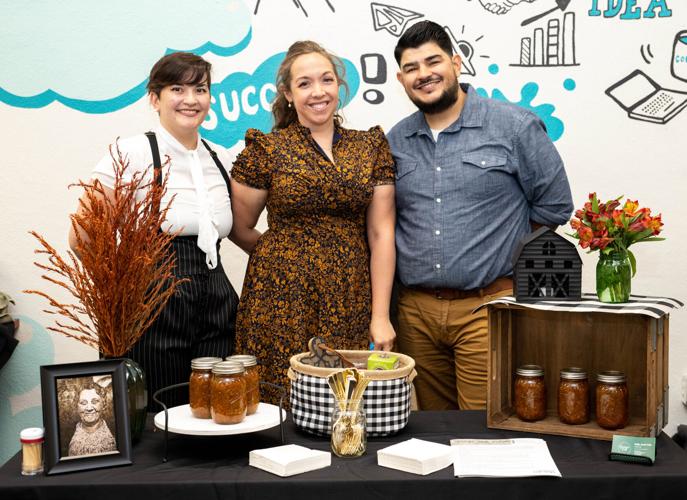Terry Kyte had an idea for a new product line for his 5-year-old Ombre Coffee Roasters: a canned coffee using the beans he roasts for his family’s Bisbee Breakfast Club restaurants and sells retail and to a few Tucson wholesale customers.
But he didn’t know exactly where to start.
Greg Smith and his wife Elizabeth flirted with the idea of creating a line of regionally flavored spice blends to complement their year-old food truck Wrapido. But after 35 years in Tucson’s day-to-day culinary industry including spending 21 years as the executive chef at the Marriott University near the UA, Smith needed some advice on how to start.
Enter StartUp Tucson, the non-profit whose sole purpose is to elevate entrepreneurs and promote innovation.
Smith and Kyte were among 15 participants of StartUp Tucson’s inaugural Recipes for Success Food Accelerator program.
For 11 weeks, participants from a 17-year-old high school junior who wants to bottle and sell his family’s generations-old horchata recipe to a class of eighth-graders pitching a Tajín pickling mix for fruits and vegetables and a bakery looking to expand its e-commerce operation learned how to develop and market new food products to help grow their existing business or launch new ones.
“It’s a great program,” said Kyte, who hopes to begin marketing a nitro cold brew and regular cold brew canned coffees next year. “It was an opportunity for me to learn a lot of the stuff I had never been taught like customer profile and lean canvasses that all these entrepreneur people deal with all the time.”

Ombre Coffee wants to roll out two styles of canned coffee early next year.
“The (program) has been amazing,” said Luis Barnett, who has plans with his wife and sister-in-law to bottle and sell their family’s generational relish recipe. “Even though we are not ready to launch at this instant, we are so much closer because of that program.”
The Food Accelerator program is funded through a two-year $300,000 grant StartUp Tucson received in 2020 to explore ways to help food-centric businesses recover and thrive from the pandemic. They partnered in the program with Merchant Gardens, Visit Tucson, BRINK Creative Group and the University of Arizona Department of Agricultural Education, Technology and Innovation.
“We were fielding calls from a lot of food entrepreneurs and even agricultural producers whose main source of revenues — markets — had closed down,” said StartUp Tucson Executive Vice President Dre Thompson. “They were suffering financially and wanted to explore ways to pivot through e-commerce to the digital world, which was a significant need.”
A key component of the Food Accelerator Program was helping the entrepreneurs develop strong e-commerce websites to introduce them to new customers and new markets in Southern Arizona and beyond.
But the big mission of the program, which StartUp Tucson will bring back in spring 2022, is to help food entrepreneurs diversify their revenue models to increase their economic stability.
That’s what the Smiths hope to do with Spicesmith, their new venture that will specialize in spice blends and seasonings based on the flavors of the Southwest.

Luis, Holly and Jessie, from Grange Hall Relish. They make a sweet relish from Holly and Jessie’s great-grandmother’s recipe that she came up with during the Great Depression.
Greg Smith said the plan is to create an online business using locally sourced products, including chiles he grows in the Rita Ranch Community Garden at 7471 S. Houghton Road that his wife created several years ago.
“I went to StatUp Tucson to have them help me to get the business up and going,” he said, especially when it comes to developing the website.
Smith said once he creates the website he’ll be ready to launch with several spice blends including an ancho pumpkin chipotle and a steak seasoning blend both flavored with locally grown chiles.
“When you buy (seasonings) from the store, they have quite a bit of salt in them. I put in less salt so you get more flavoring from the chiles. You get a better sense of the flavor profile of the chiles,” Smith said. “That’s how mine, I think, are different.”
Kyte is looking for a canning company so that he can begin producing his canned Ombre No Magic coffees early next year. He estimated it will cost him around $10,000 to launch the venture and he plans to sell the cans in his family’s restaurants as well as through a few of his coffee clients including Tumerico, Gourmet Girls Gluten Free Bakery/Bistro and Locale Neighborhood Italian restaurant.
New Tucson restaurants and bars opened in fall 2021
Thunder Bacon Burger Co.
Updated
The Thunder Classic burger is two patties topped with bacon, American cheese, thunder sauce, lettuce and a pickle.
This new burger joint at 621 N. Fourth Ave. is the newest venture of Lindon "Lindy" Reilly, who founded Lindy's On 4th.
Several of Thunder Bacon Burger Co.'s burgers feature the flavors of the Southwest, specifically roasted green chiles and chorizo, and of course, they all have bacon.
Flaps and Racks/Acai Paradise
Updated
Jeffrey Flores, left, and Auxi Navarro at Flaps and Racks and Acai Paradise, 3253 E. Valencia Road.
Jeffrey Flores and his wife/business partner Auxi Navarro are bringing twin restaurants Flaps and Racks and Acai Paradise to 3253 E. Valencia Road.
Flaps and Racks will offer bone-in and boneless chicken wings and Korean-style barbeque ribs, while Acai Paradise serves housemade oatmeal and acai bowls and fruit smoothies.
Ding Tea
UpdatedThis Taiwanese tea house opened as Tucson's first location in September at 2739 E. Speedway Blvd.
Ding Tea offers trendy milk and boba teas, as well as fruity, flavored teas and slushies. Their full menu can be found here.
Perché No Italian Bistro
Updated
Krissy and Bruno Girardi plan to reopen the space that once housed Caffé Milano as Perché No, which means “why not?” in Italian. The Girardis say they fell in love with Tucson while on a cross-country road trip.
Meaning "why not?" in Italian, Perche' No opened this fall in the former Caffé Milano space downtown at 46 W. Congress St.
Some of the new Italian bistro's menu items include pesto ravioli, lamb lollipops, spaghetti puttanesca, and calamari fries.
Black Rock Coffee Bar
Updated
The new Black Rock Coffee Bar at 1821 E. Broadway will be the first of at least four Tucson locations for the boutique coffee chain.
Tucson recently welcomed a Black Rock Coffee Bar store at 1821 E. Broadway Blvd., where customers can stop in or use the drive-thru to grab their favorite javas, teas, energy drinks, and smoothies.
This is the first of at least four locations the Portland-based company plans to open in Tucson.
Meyer Avenue Cafe
UpdatedMeyer Avenue Cafe, opened Sept. 20, 2021 on the same property as the Coronet and Nightjar, offers reimagined brunch staples, pastries, and an array of coffee and other beverages.
The attached Mercantile, 353 S. Meyer Ave., offers homemade goods and gifts, including beer and wine selections.
The Jackrabbit Lounge
Updated
Kaitlyn Mills and Chris Vick line up a shot with the backgrounds, tripods and lights set-up in the Instragram hallway at The Jackrabbit.
This new retro-themed bar is bringing drinks, live music, drag-queen-hosted trivia nights, karaoke, and an Instagram-worthy atmosphere to 2000 N. Oracle Road.
Adult bourbon-infused milk shakes and Old Fashioneds can be found on The Jackrabbit's menu, along with shareable dishes like cauliflower fritters, mac 'n' cheese, and spicy Korean-style meatballs.
Bubbe’s Fine Bagels
Updated
Bubbe's Fine Bagels brings east-coast style bagels to the east side of Tucson.
If you have been looking for a locally-owned place to grab a bagel and schmear, look no further than Tucson's newly-opened Bubbe's Fine Bagels at 1101 N. Wilmot Road.
If you happen to come across the framed photo of Barbra Streisand inside the shop, make sure to say "Hello, gorgeous" before chowing down on a bagel sandwich.
Little Love Burger
Updated
The BarBQtie at Little Love Burger includes swiss and cheddar, bacon, tomato, arugula, pickled onion and barbecue sauce.
Downtown Tucson welcomed another burger-centric restaurant this fall, this time at 312 E. Congress St.
Little Love Burger, brought to us by the minds behind Playground Bar & Lounge and Hub, opened in October in the former Diablo Burger location.
In addition to burgers, the menu here offers hot dogs, chicken sandwiches and a full breakfast menu.
EspresSoul Cafe
UpdatedThis new coffee truck opened just in time for pumpkin spice latte season and you will most likely see it at various locations across Tucson.
EspresSoul Cafe's honey lavender espresso, cookies and cream frappes, and fruit smoothies are some of the items available at the traveling cafe. To see where they will be stopped next, check out the EspresSoul Facebook page.
8 Degrees Ice Cream and Cookies
UpdatedIf you get a sweet tooth while shopping at St. Phillip's Plaza or grabbing a drink in the center courtyard, 8 Degrees Ice Cream & Cookies is just a few steps away.
The new ice cream shop at 4320 N. Campbell Ave. gives you several options of ice cream flavors, toppings and cookies (including vegan-friendly ones) to design your own ice cream sandwich.
You can also choose one off the menu or buy cookie dough to bake at home.
Wow Wow Lemonade Stand
Updated
Wow Wow Lemonade Stand started in Maui in 2012 and opened a stand this week at 7705 N. Oracle Road.
This Hawaii-based all-natural lemonade shop, which has a drive-thru, recently opened at 7705 N. Oracle Road in Oro Valley.
Some of Wow Wow's colorful lemonade flavors include strawberry mint, lava flow, and lavender blackberry. The menu also features health-conscious treats like smoothie bowls, avocado toast, and flatbread sandwiches.
Fiesta Filipina
Updated
Thelma Ward, owner of Fiesta Filipina, talks with friend and longtime customer Beth Jacobsen while preparing Jacobsen's order.
Fiesta Filipina got its start as a food truck a few years back, but now has a spot inside the Park Place Mall food court, at 5870 E. Broadway Blvd.
Filipino food can be hard to find in Tucson, but Fiesta Filipina offers some classic dishes like lumpia, pancit rice noodles, chicken and pork adobo, halo-halo and dinuguan, a pork blood stew.
Buendia Breakfast & Lunch Cafe
Updated
Buendia’s poblano pepper is stuffed with a fresh green corn tamale.
Buendia Breakfast & Lunch Cafe opened two months ago at 2530 N. First Ave., where the now-closed Asian Sofrito used to operate.
Buendia's breakfast and lunch menus feature a range of burritos, huevos rancheros, nopales, tacos, soup, seafood, and vegetarian and vegan-friendly options.







